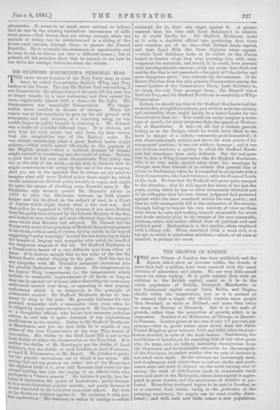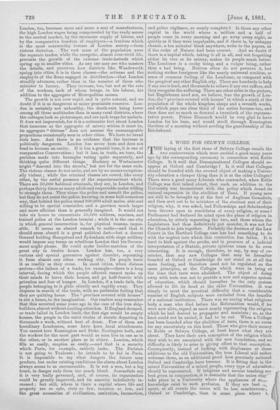THE GROWTH OF LONDON.
THE new Census of London has been published, and the figures, which show an increase within the decade of more than half a million, have been received with the usual mixture of admiration and alarm. We see very little sound. reason for either feeling.. It is quite natural that such an addition to the British capital, equal as it is to the whole population of Dublin, Liverpool, Manchester, or any Continental capital except Paris, Berlin, and Naples, should strike the imagination, just as it is natural to be amazed that a single city should contain more people than Scotland, as many as Holland, and more than twice as many as Norway or Denmark. But it is the scale of growth, rather than the proportion of growth, which is so impressive. London is no Melbourne, or Chicago, or Barrow- in-Furness. London grOws at the rate of only 1.7 per cent. per annum,—that is, grows rather more slowly than the whole United Kingdom grew between 1815 and 1861, when its popu- elation doubled, in spite of the Irish famine. Considering the healthiness of London, so far exceeding that of any other great city, its large, and, we believe, increasing immigration from the Continent, and its irresistible attraction for the energetic of the Provinces, we rather wonder that its pace of increase is not much more rapid. As the railways are increasingly used, and shopkeepers seek everywhere to reduce stocks, and profit comes more and more to depend on the swift turning-over of money, the work of distribution tends to concentrate itself more and more in the Metropolis, where alone capital is aggre- gated in great masses, and the mechanism of transfer is per- fected. Everything produced begins to be sent to London, as to a reservoir from which, owing to the perfection of the pumping machinery, the supply can be most readily distri- buted ; and with each new trade comes a new population.
London, too, becomes more and more a seat of manufactures, the high London wages being compensated by the ready access to the central market, by the enormous supply of labour, and by the comparative freedom of employers—a freedom which is the most noteworthy feature of London society—from riotous dictation. The vast mass of the population awes the separate trades, while the energetic, almost over-vivid life, prevents the growth of the extreme trade-hatreds which spring up in smaller cities. As any one may see who masters the details, and perceives how districts like Wandsworth ,spring into cities, it is in these classes—the artisans and the employOs of the firms engaged in distribution—that London steadily advances, rather than in the number of those who minister to luxury. They increase, too, but not at the rate of the workers, each of whom brings, in his labour, his addition to the aggregate of Metropolitan means.
The growth is not over rapid, and is quite natural, and we doubt if it is as dangerous as many pessimists conceive. Lon- don is certainly not unhealthy, the death-rate being lower among all these multitudes than in many rural districts, where the cottages look so picturesque, and are such traps for malaria. It does not impoverish, for it is a noticeable fact about London that immense as the aggregate of misery within it must be, its aggregate " distress" does not assume the unmanageable proportions occasionally seen in other cities. We have no bread riots here. And there is no evidence that the increase is politically dangerous. London has never been and does not tend to become an entity. If it has a general tone, it is one of comparative Conservatism ; but it has, in truth, no tone, the parishes made into boroughs voting quite separately, and thinking quite different things. Hackney or Westminster might " descend into the streets," but not for the same ends. The riotous classes do not unite, and are by no means exception- ally violent ; while the criminal classes are cowed, like every other, by the awful pressure of the superincumbent whole. There are 30,000 habitual criminals, they say, in London, and perhaps thirty times as many adult and respectable males willing to strangle them. They abuse the police and assault the police, but they do not resist the police, knowing, in some half-conscious way, that behind the police stand 900,000 adult males, able and willing to be special constables, and a garrison much larger and more efficient than is generally imagined. It would not take six hours to concentrate 50,000 soldiers, marines, and trained police at the London termini ; while it is the one city in which general insurrection is, for physical reasons, impos- sible. It seems an absurd remark to make—and that it ehould seem absurd is a great political fact—but a decent General holding Hampstead and Sydenhana with siege artillery would impose any terms on rebellious London that his Govern- ment might please. He could make lucifer-matches of the great city in twelve hours. London has, too, a very curious and special guarantee against disorder, separating it from almost any other working city. Its people leave
it as readily as they come. In most cities, when distress ,arrives—the failure of a trade, for example—there is a long interval, during which the people affected cannot make up their minds to leave their homes, and go half-frantic with privation and fear of hunger. In London, if a trade fails, the people belonging to it glide silently and rapidly away. They disperse in search of the trade, with no particular feeling that they are quitting home. The " province covered with houses" is not a home, to the imagination. Our readers may remember that this occurred some years ago in the case of the iron ship- builders, almost without exciting attention. If England decayed, or trade failed in London itself, the first sign would be empty houses, the people in the outer circles of streets departing in thousands a week, without beat of drum. Few of them are hereditary Londoners, none have keen local attachments. You cannot love Kennington and Stoke Newington both, and the workers for the most part would as soon live in one as in the other, or in another place as in either. London, which fills so easily, empties as easily,—and that is a security which Paris, for example, entirely lacks. The Parisian is not going to Toulouse ; he intends to be fed in Paris. It is impossible to say what dangers the future may produce, but under existing conditions the alarm about London always seems to us unreasonable. It is not a wen, but a big heart, in danger only from too much blood. Journalists say it is very badly governed, and, of course, its organisation could be greatly improved, and its amenity indefinitely in- creased ; but still, where is there a capital where life and property are so safe, riots so few, taxation so low, and the great necessities of civilisation, sanitation, locomotion, and police vigilance, so nearly complete ? Is there any other capital in the world where a million and a half of people come in every morning and go away every night, as quietly as if they were impalpable, and if there is, by unhappy chance, a ten minutes' block anywhere, write to the papers, as if the order of Nature had been overeat. And we doubt if there is a capital which, taking it all in all, and not forgetting either its vice or its misery, makes its people much better. The Londoner is a cocky being, and a vulgar being, rather than a bad being. Natives often do not perceive it, but nothing strikes foreigners like the nearly universal civiliias, or sense of common feeling, of the Londoner, as compared with the people of any other English city. There are hundreds to help if any one is hurt, and thousands to relieve if any one suffers, and they recognise the suffering. There are other sides to the picture, but Englishmen need not, we believe, fear the growth of Lon- don, the " province covered with houses" in which a ninth of the population of the whole kingdom Bleeps and a seventh works, and which pays one clear third of the entire Income-tax, and then does not so much as demand a twentieth of the represen- tative power. Prince Bismarck would be very glad to have London for his base, and would stroll through Kensington Gardens of a morning without needing the guardianship of the Iieicbshund.



































 Previous page
Previous page